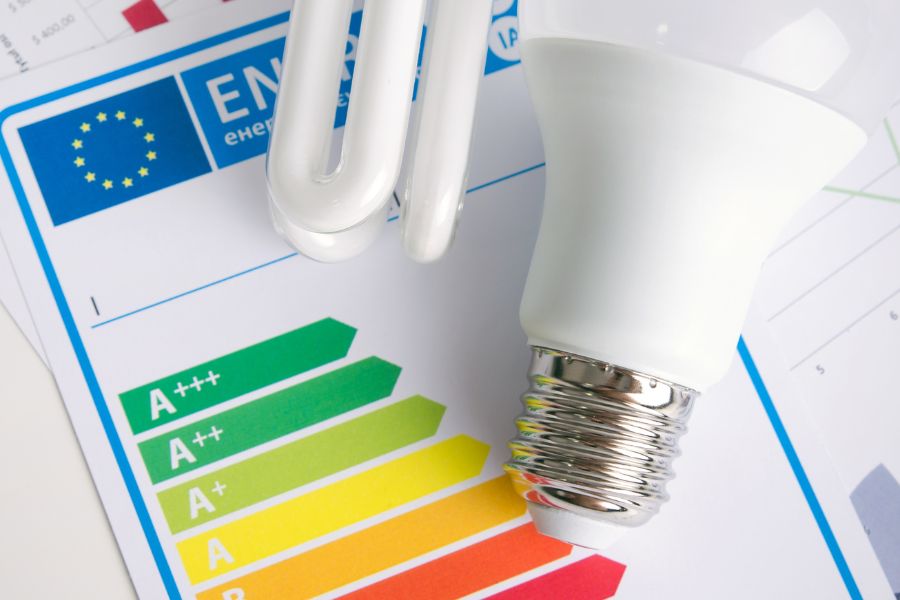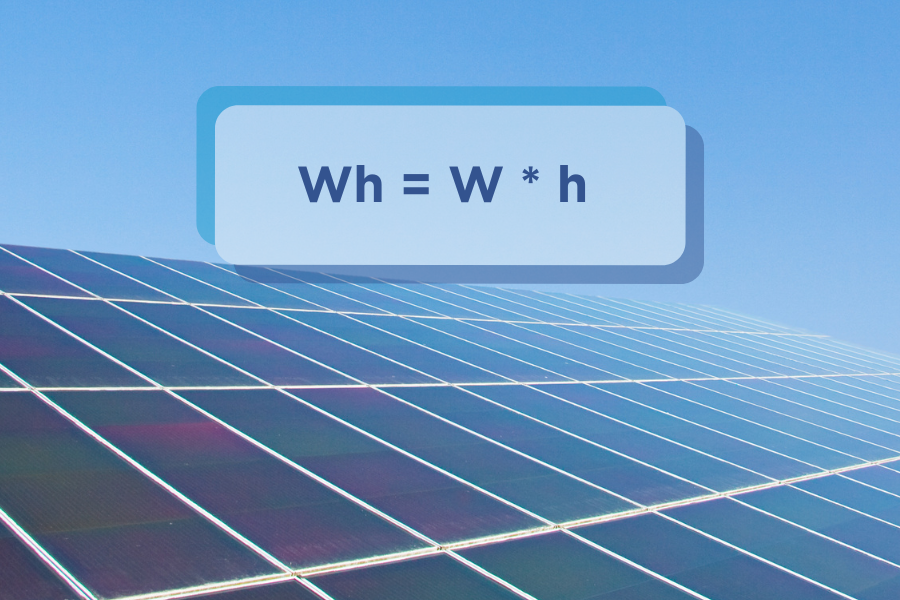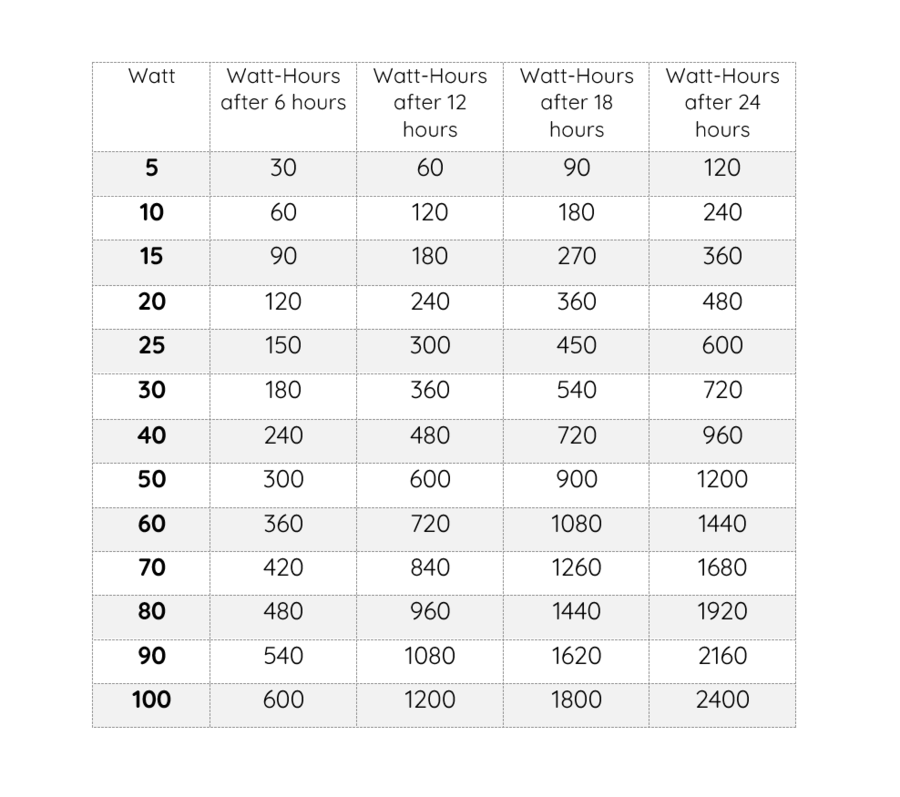Wh × hrs =
0.00 Wh
Conversion formula: Wh = W × hrs
What Is Watt (W)?
Watt is the S.I unit of power. Power, in turn, is the rate at which energy is transferred within a system. In electrical terms, power is the energy transfer rate per second within a circuit.
Going by the definition of power, watt measures the amount of energy transferred per second within a circuit. In other words, 1 watt of power equals the transfer of 1 joule of energy in 1 second.
What Is a Watt-Hour (Wh)?
Watt-hour is a unit of energy. It is typically used to measure energy usage by electrical devices/appliances or energy production by energy sources like batteries.
Watt-hour represents the energy consumption or energy production when a device consumes or produces a certain amount of power for a specific number of hours. In other words, when a device consumes one watt of power for one hour, it would have consumed one watt-hour of energy.
More examples: If a solar panel produces 50 W for 5 hours, it would have produced 250 Wh of energy. Then, if a solar refrigerator uses 25 W for 3 hours, its energy usage would be 75 Wh.
Why Calculate Watt-Hours?
We calculate watt-hours for many reasons, one of which is to manage our electricity usage. When you know the total watt-hours of the appliances in your home, you can forecast your electricity usage. This way, you know what to expect when the energy bill comes.
If the bill is way more than what you can afford, you can calculate the watt-hours of each appliance to know how much electricity they are using. Once you know how much energy each appliance uses, you know where to cut down on electrical energy consumption.
For instance, an incandescent light would likely have higher watt-hours than an LED light. So, you can consider changing your incandescent lightbulbs to LED lightbulbs to reduce your total energy usage.

How to Calculate Watt-Hours (Wh) of an Appliance
Calculating the watt-hours of an appliance is pretty straightforward when we know the power consumption and time period of power consumption (in hours). In such a situation, we must multiply both values to get the watt-hours.
\(watt\mbox{-}hour = watt * hour\)
So, if we have a solar gate opener with a wattage of 10W, after running for 3 hours, it would have consumed the following amount of electricity:
\(10 * 3 = 30\ Wh\)
In cases where we do not know the wattage but know the voltage, amperage, and hours, we can calculate the watt-hours of household appliances by multiplying the value of all three quantities together.
\(watt\mbox{-}hour = volts * amps * hour\)
So, if we have a solar-powered camera running on a 12v battery, drawing 8 amps for 2 hours, its energy consumption would be:
\(12 * 8 * 2 = 192\ Wh\)
In all the calculations above, we estimate watt-hours from appliance specifications.
In reality, the result from your calculation will not be the same as the real thing because no electric circuit is 100% efficient.
So, if you want it, you can get actual watt-hours with an electricity usage monitor.
How to Calculate Watt-Hours (Wh) of a Battery
To calculate a battery’s watts-hours, we have to multiply the battery voltage (volts, v) and battery capacity (amps-hour, Ah).
\(watt\mbox{-}hour = volts * amps\mbox{-}hour\)
So, if we have a solar power system whose 12v battery has a capacity of 100Ah, its energy in watt-hours would be:
\(12 * 100 = 1200 Wh\)
Then, we can convert watt-hours back to battery capacity by dividing the value of watt-hour by battery voltage:
\(\displaystyle{\frac{1200}{12}} = 100\ Ah\)
Converting watt-hours to voltage is also possible when we divide it by capacity:
\(\displaystyle{\frac{1200}{100}} = 12\ V\)
How to Convert Watts to Watt Hours (W to Wh)

To convert watts to watt-hours, we have to multiply the watts value by the hour value.
Conversion Formula
\(watt\mbox{-}hour = watts * hour\)
Example: Watts to Watt-Hours (W to Wh)
So, if we have a solar flood light with a wattage of 100 W, and it runs for 8 hours, here’s how much energy it will consume:
\(100 * 8 = 800\ Wh\)
Similarly, say we have a solar power system whose solar panels have a wattage of 200 W. If the panels are exposed to the sun for 5 hours, here’s an estimate of how much electricity they’ll generate:
\(200 * 5 =1000\ Wh\)
What’s the Difference Between Watts and Watt-Hours?
The primary difference between watts and watt-hours is the quantity they measure.
While watts measure how much power electrical equipment consumes or generates, watt-hours measure the energy usage or production of an electrical system or device.
While watts are an SI unit, watt-hours are not an SI unit. In many cases, you’ll only find watt-hour (Wh) used as a unit for electrical energy.
What About Kilowatt-Hours (kWh)?
Kilowatt-hours is a measure of the energy consumed or produced when a certain amount of power (in kilowatts) is used or given off during a given time. In other words, one kilowatt-hour of energy is generated or used when one kilowatt of power is consumed or emitted for one hour.
Like watt-hour (Wh), kilowatt-hours (kWh) is a unit of energy. However, kilowatt-hour measures the energy at a higher magnitude than watt-hours.
The metric prefix kilo distinguishes kWh from Wh in that kWh measures energy in thousands while Wh does so in units.
How to Convert Watts to Kilowatt Hours (W to kWh)
When you know how long a device or appliance has been operating, converting watts to kilowatt-hours is straightforward.
First, you must convert watts to kilowatts by dividing the value by 1000. Next, you’ll multiply the value of kilowatts by the number of hours the device or appliance has been operating. This will give us the conversion of watts to kilowatt-hours.
Conversion Formula
\(kilowatt\mbox{-}hour = \displaystyle{\frac{watt}{1000}} * hours\)
So, say we have a solar panel whose wattage is 100 W. If this panel is exposed to intense sunlight for 4 hours, how many kWh of electricity will it generate?
\(kWh\ of\ the\ solar\ panel = \displaystyle{\frac{100}{1000}} * 4 = 0.4\ kWh\)
What Is a Watt-Hour (Wh)?
A watt-hour is the typical unit of electricity usage or production. It quantifies how much energy electrical devices consume or how much electricity electrical power sources like batteries discharge.
Since electrical energy is a product of power consumption/production and time period of consumption/production, we can say one watt-hour (Wh) is the consumption/production of one watt of power for one hour.
What Is Watts?
Going by the international system of units, watts is the unit of power. In the context of electricity, it measures energy consumption/production (in watt-hour) per hour. So, one watt is the consumption or production of one watt-hour of energy per hour.
How to Calculate Watt-Hours from Watts?
The steps involved in calculating watt-hours from watts are pretty straightforward as long as we know the number of hours for which watts were consumed or generated.
To calculate watt-hours from watt, all we have to do is multiply the value of watts by the number of hours:
\(watt\mbox{-}hours\ (Wh) = watt\ (W) * hours\ (h)\)
Example 1
If a 25 W television stays on for 8 hours a day, what’s its total energy usage after 7 days?
To solve this, we’ll start by calculating the television’s daily energy usage:
\(25 * 8 = 200\ Wh\)
Now that we know the television consumes 200 Wh per day, in 7 days, it would have consumed:
\(7 *200 = 1400\ Wh\)
Example 2
What’s the estimated energy a 100 W solar panel produces whenever it is exposed to the sun for 5 hours?
The estimated energy production of the 100W panel after 5 hours in the sun would be:
\(100*5 = 500\ Wh\)
Watts to Watt-Hours Quick Conversion Chart

Why Convert Watts to Watt-Hours?
Generally, we convert watts to watt-hours to estimate energy consumption. In turn, estimating our energy consumption can come in handy when estimating and cutting down our energy bills or choosing a power station.
Estimating and Reducing Energy Bills
Say our total energy bill comes from the load of a 20W TV, 10W ceiling fan, and a 150W refrigerator. If the TV stays on for 5 hours daily while the fan runs for 6 hours and the refrigerator for 8 hours, the total daily energy usage of all three (in watt-hour) would be:
\(\small{(20 * 5) + (10 * 6) + (150 *8) = 100 + 60 + 1200 = 1360\ Wh}\)
If we pay 23 cents for every 1000 Wh of electricity usage, our energy bill at the end of 30 days would be:
\(\small{1360 * 0.023 * 30 = 938.4\ cents = 9.38\ dollars}\)
Thanks to our knowledge of how to obtain watt-hours from watts, we have a fair range of what to expect on our energy bill at the end of the month. But what if we’d rather have a lower bill?
In that case, we can adjust/reduce the number of hours each device runs. For instance, if we make the TV run for 3 hours while the refrigerator does 5 hours and the fan does 5 hours, our new daily energy use (in watt-hour) would be:
\(\small{(20 * 3) + (10 * 5) + (150 * 5) = 60 + 50 + 750 = 860\ Wh}\)
At the end of the month, 860 Wh would cost us:
\(860 * 0.023 * 30 = 593.4\ cents = 5.93\ dollars\)
This is lower than the initial 9.38 dollars.
By being able to convert watt to watt-hours, we were able to adjust our overall electricity usage.
Choosing a Solar Power Station
Converting watts to watt-hours is also useful when choosing a solar power station.
If we intend to use a total load of 100 W on a solar power station for 8 hours, converting watt to watt-hours will tell us how much energy would be consumed and the minimum capacity of the power station to opt for.
So, if we convert 100 W for 8 hours to watt-hours, we’ll have:
\(100 * 8 = 800\ Wh\)
Going by the above, we need a power station whose capacity is at least 800 Wh if we want our 100W load to run for up to 8 hours.
Watts vs Watt-Hours: What’s the Difference?
The primary difference between watts and watt-hours is that they measure power and electrical energy, respectively.
Besides that, watts is an SI unit. Watt-hours, on the other hand, is a derived unit. The SI unit for energy (all types of energy) is Joules.
How to Convert Watts to Kilowatt-Hour (W to kWh)
The formula for converting watts to kilowatt-hours is almost the same as that for converting watts to watt-hours. The main difference is that when converting watts to kilowatt hours, besides multiplying watts and hours, we must divide by 1000.
So, to convert watt to kilowatt-hours:
\(kilowatt\mbox{-}hour\ (kWh)= \displaystyle{\frac{watt\ (W) * hour\ (h)}{1000}}\)
How to Convert Watt-Hours to Amp-Hours (Wh to Ah)
- To convert watt-hours to amp-hours, we’ll divide the value of watt-hours by voltage:
\(Ah = \displaystyle{\frac{Wh}{V}}\ (1)\)
- To explain (1), we need to state the formula for converting watt to watt-hours:
\(Wh = W * h\ (2)\)
- Next, the formula for power (W):
\(power = voltage * current\ (3)\)
- Replacing the quantities in (3) with their units:
\(W = V * A\ (4)\)
- Now, we’ll substitute W for V x A in (2):
\(Wh = V * A * h\ (5)\)
- We can rewrite (5) as:
\(Wh = V * A h\ (6)\)
- Finally, we’ll make Ah the subject of (6) to get the watt-hour (Wh) to amp-hour (Ah) conversion formula:
\(Ah = \displaystyle{\frac{Wh}{V}}\)

